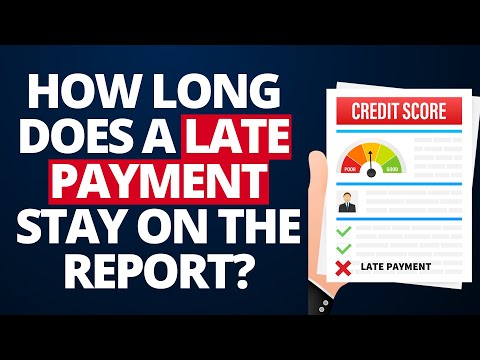How Long Do Late Payment Stay On Credit Report? 7-Year Late Payment Rule
Understanding the ins and outs of credit reports can feel like trying to navigate a financial jungle without a compass. A single misstep, such as a late payment, can leave an indelible mark, but how long do late payments stay on a credit report? That’s the million-dollar question for many, especially those with a twinkling dream of homeownership dangling just beyond reach because of their credit history. So let’s dive into this, untangling the complex web of credit reporting and shining a light on that pesky 7-year stain.

Decoding The Credit Report: How Long Can Late Payments Linger?
- A credit report is a detailed dossier of your financial history—a beacon for lenders trying to decipher your creditworthiness.
- Late payments unhappily take up residence on your report, showing up as splotches that signal to lenders that you’ve had hiccups with timely payments.
- These financial faux pas have a standard residence time: typically, they linger for seven years. But is it all set in stone?

The Duration Of Late Payments: How Long Do They Really Stay?
To get the full picture, we need to look at how policy and law frame the answer to ‘how long do late payments stay on a credit report’.
- Legislation such as the Fair Credit Reporting Act (FCRA) governs the world of credit reporting, dictating the rules of engagement.
- Diving into real-life scenarios, the impact of late payments on credit scores is as varied as the people they affect. Sam, who missed a mortgage payment, saw his score dive faster than a falling star, while Jamie’s brief dalliance with a 30-day late payment on a credit card was a stark wake-up call.
- Credit experts unanimously concur: the system is designed for the long haul. A late payment is an unwelcome houseguest that overstays its welcome by years, not days.

| Factor | Detail |
|---|---|
| Duration on Credit Report | – Seven years from the date of the initial late payment. |
| Impact on Credit Scores | – Initially significant (up to 100 points or more). |
| – Diminishes over time. | |
| Removal Conditions | – Only possible if reported in error. |
| – Requires a dispute to be filed with the credit bureau. | |
| Effect of Single Late Payment | – Can impact score significantly, even if it’s the first time. |
| Effects of Subsequent Late Payments | – Late payment after 30 days: affects 33% of people with FICO® Scores of 700. |
| – Increase in impact with severity (e.g., 90-day late payment has a more prolonged effect). | |
| Recovery Time | – Varies by event: |
| * Hard inquiry: a few months. | |
| * 30-day late payment: months to years. | |
| * 90-day late payment or major negative events (e.g., foreclosure): potentially much longer. | |
| Credit History Consideration | – A longer credit history with occasional late payments may be indicative of risk but is considered within context. |
| – Tendency toward high credit usage rates seen as negative. | |
| Advice for Consumers | – Maintain timely payments to avoid negative impacts. |
| – Monitor credit reports regularly for errors. | |
| – Act promptly to dispute any inaccuracies. |
Types of Late Payments: From Delinquent to Default
Let’s paint a clearer picture of the late payment landscape:

Missed Credit Card Payment By 1 Day: Does It Count?
Imagine the scenario: you forget a payment by a mere 24 hours. What happens next?

Long-Term Implications: The 7-Year Mark
Understanding the chronology of a late payment’s life span is crucial:
Navigating Credit Repair: Mitigating The Stain Of Late Payments
Arm yourself with credit battle gear: knowledge, vigilance, and a good dispute letter:
Late Payment Remedies: Beyond The Credit Report
Prevention is better than cure:
Conclusion: Life After The 7-Year Credit Stain
Whew, that was a journey through the credit wilderness, wasn’t it? Here’s what we’ve learned:
Remember, folks, credit scores are the passport to your financial freedom. Late payments are no trifles, but their impact doesn’t have to be your financial endgame. Play smart, stay vigilant, and approach credit with the delicacy and strategy of a master chess player. It’s your move. For a deeper dive into tackling a bumpy credit past, look no further than the wisdom of MortgageRater.com, where you can find salvation from a bad credit home loan to learning just how much your credit score decreases each time it is checked. Your financial health is worth every ounce of effort—never forget that.
How Long Do Late Payments Stay on Your Credit Report?
When it comes to managing our finances, we’ve all had our ups and downs—like that time you might’ve paid your credit card bill a smidge late. 🕒 And while it’s a bit of a bummer, it’s essential to grasp just how long that little slip-up can stick to your credit report like gum on a shoe.
The Seven-Year Itch
Alright, so here’s the scoop: generally, a late payment will hang out on your credit report for a whopping seven years! Talk about a long-term relationship you didn’t sign up for, right? This seven-year credit stain can be a thorn in your side, especially when you’re looking to clean up your act and improve your financial street cred.
But don’t throw in the towel just yet! Each year that passes can make that late payment sting a bit less. And let’s not forget, there’s a silver lining to this cloud – staying squeaky clean with payments moving forward can really help patch things up over time.
No Need to Panic
You might be thinking, “Seven years? That’s like forever in credit time!” And I hear you, but here’s the thing: not all late payments are created equal. If you’re only a tad late, like 30 days or so, and you get back on track pronto, the impact might not be as dreadful as you think.
However, if we’re talking fashionably late, as in 60 days or more, brace yourself. The further behind you are, the more your credit score might take a hit. But hey, we all trip up now and then—the trick is to get up, dust yourself off, and get those payments current faster than you can say “credit report amends”!
A Quick Peek Can Lead to a Slight Tweak
Curious about your credit score and fancy a quick peek? It’s natural to want to know where you stand, but you might hold off thinking, “Wait, won’t that make my credit score nosedive?” Well, here’s a fun fact: checking your own credit score is a soft inquiry, which means it’s as harmless as a puppy’s lick!
Now, if a lender checks your credit because you’re applying for a loan, that’s a different story. This hard inquiry can indeed cause your score to take a little tumble. But how much of a tumble, you ask? Well, wonder no more, because we’ve got the 411 on How much Does a credit score decrease When it Is checked!
Keep Calm and Carry On
So yeah, you’ve got this seven-year itch to scratch off your report, but it’s not the end of the world. Take a deep breath, focus on the now, and remember that time has a way of healing all wounds—even credit report ones.
In the end, just like that gym membership you never use, the impact of a late payment will eventually fade away. Until then, stay on top of your bills, check your score regularly (without fretting about a dip from a peek), and know that in the grand credit score arena, it’s all about how you play the game moving forward. Keep your chin up, manage your dough wisely, and before you know it, that late payment will be nothing but a distant memory.

Can I get late payments removed from my credit report?
– Oops! If you’ve slipped up and a late payment has reared its ugly head on your credit report, you’re stuck with it for a time—unless it’s a mistake, of course. Late payments are like a bad cold—they linger annoyingly for seven years. But hey, don’t sweat it too much; their impact fades as time goes by. Need it gone yesterday? If it’s an oopsy from the credit bureau, filing a dispute is your golden ticket to clearing it up.
Can you have a 700 credit score with late payments?
– Well, knock on wood, but having a 700 credit score with a few late payments isn’t as rare as a unicorn sighting. Get this—about a third of folks with that kind of score have been late at least once. So, if your credit history is like a long movie with a couple of blooper scenes, such as the occasional tardiness or a penchant for pushing your credit limits, you’re not exactly alone.
How much does 1 late payment affect credit score?
– Brace yourself—just one late payment can send your credit score tumbling down a cliff, maybe knocking it by a whopping 100 points or more! It’s a hefty price to pay, and the damage done depends on what your score is to begin with and which scoring model we’re gabbing about. So, cross your fingers it doesn’t happen, but if it does, you’re in for a steep climb back up!
How long does it take credit score to recover after late payment?
– Ever wondered how long it takes for your credit score to shake off the blues after a late payment? It’s kinda like getting over a flu—it varies. Hard inquiries might just be a few months’ worth of sniffles, while a 30-day payment delay can give you a cough that lasts months or even years. And if you’re dealing with the credit flu from bigger hiccups, like a 90-day delay? Buddy, that’s a much longer road to recovery.
Is it true that after 7 years your credit is clear?
– Seven years may feel like a lifetime, but when it comes to your credit report, it’s the magic number. It’s not exactly a slate wiped squeaky clean, but after those years, late payments do vanish into thin air. While seven years can seem like forever when you’re waiting, remember, every year helps you out a bit more. Hang tight, pay on time, and you’ll see the sunshine after the rain.
How can I raise my credit score after late payments?
– So you want to give your credit score a little nudge upward after some late payments? First step: keep up with current bills; on-time payments are like the credit score fairy, working magic over time. Next, chomp down on existing debt like it’s your favorite snack—lowering your credit usage always looks good. And, throw in a mix of credit types if you can—it’s like adding sprinkles on top. Stick with it, and you’ll be climbing up the score ladder in no time.
Is 650 a good credit score?
– Is 650 a decent credit score? Well, it’s not the belle of the ball, but it’s not a party pooper either. It’s sitting somewhere in the “fair” range. You might not snag the best rates and terms that the high rollers get, but you’re also not in the credit doghouse. With a little work and some timely payments, you can spiff it up.
Can I buy a house with a 587 credit score?
– Planning to plant your flag in a new home with a credit score of 587? It’s definitely on the tougher side of the road, but hey, don’t toss out your dream just yet. While it’s below the usual benchmarks for those brag-worthy interest rates and a smooth approval process, some lenders might still roll out the welcome mat with some extra conditions or a higher interest rate. Time to charm the socks off those lenders!
How rare is a 700 credit score?
– A 700 credit score, rare? Not quite like finding a four-leaf clover. Many might think it’s high up there, but in reality, it’s more like being part of a cool club—a good, solid score that a fair number of people do boast. It’s not in the VIP lounge of the 800s, but it’s definitely getting a nod from the bouncer at the credit score party.
Will 2 late payments ruin my credit?
– Will two late payments kick your credit score to the curb? Not quite ruin, but imagine it’s like tripping up in front of your crush—embarrassing and a tad bit hurtful. It may feel like you’ve dropped your credit ice cream cone, but remember, time heals all wounds… or most, at least. Keep steady for a while, and your credit will dust itself off.
Can you have a 800 credit score with late payments?
– Reaching that 800 credit score peak with late payments on record? It’s tough, but not impossible—think climbing Mount Everest with a sprained ankle. It’s all about the bigger picture; a few mishaps can be overshadowed by a rock-solid history of credit mastery. Keep your borrowing habits on the straight and narrow, and you could be waving that flag at the 800 summit, looking down at less lofty scores.
How do I ask my creditor to remove a late payment?
– “Dear creditor, about that late payment…”—ring a bell? Asking for a late payment removal is a bit like asking for extra gravy on the side—it can’t hurt to ask, right? Reach out with a goodwill letter, explain the whoops-a-daisy circumstances, keep it cordial and polite, and hope they’re feeling generous. It’s not guaranteed, but if you usually pay on time, they might just grant your wish.
What is a 609 letter to remove late payments?
– A “609 letter” isn’t a spell from Hogwarts, but it might seem like one. It’s a request you can make under the Fair Credit Reporting Act, asking credit bureaus to make sure they can verify the accuracy of the late payments on your report. No verification? Presto change-o, it might have to disappear! But remember, this isn’t a get-out-of-jail-free card for legit late payments.
Do goodwill letters work for late payments?
– Goodwill letters are like sending a smiley face to your creditor—they’re a friendly nudge, not a command. They’re worth trying if you’ve been a good customer who hit a bump in the road. A kindly worded “pretty please with sugar on top” might just do the trick and persuade them to erase that one-time boo-boo. Can’t guarantee it’ll work, but hey, might as well shoot your shot!
How do I ask for goodwill deletion?
– Chatting up your creditor for a goodwill deletion is kinda like asking for extra ketchup at a diner—straightforward and polite is the way to go. Scribble down a letter explaining the oopsie daisy, toss in a little flattery about their exceptional service, and cross your fingers they’ll spot you this one. Keep it honest, keep it humble, and who knows, they may just decide you deserve a break today.



